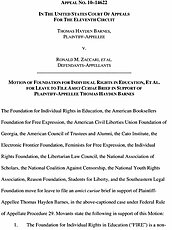Learn more about Cato’s Amicus Briefs Program.
Few could imagine a more troubling free speech and due process case than that of Hayden Barnes. Barnes, a student at Valdosta State University in Georgia, peacefully protested the planned construction of a $30 million campus parking garage that was the pet project of university president Ronald Zaccari. A “personally embarrassed” Zaccari did not take kindly to that criticism and endeavored to retaliate against Barnes — ignoring longstanding legal precedent, the Valdosta State University Student Handbook (a legally binding contract), and the counsel of fellow administrators. Zaccari even ordered staff to look into Barnes’s academic records, his medical history, his religion, and his registration with the VSU Access Office. The district court found that Barnes’s due process rights had indeed been violated and denied Zaccari qualified immunity from liability for his actions. Now on appeal, Cato joined a brief filed by the Foundation for Individual Rights in Education on behalf of 15 organizations arguing that qualified immunity is inappropriate here given Zaccari’s brazen violation of Barnes’s constitutional rights to free speech and due process. As stated in the brief, the “desire of some administrators to censor unwanted, unpopular, or merely inconvenient speech on campus is matched by a willingness to seize upon developments in the law that grant them greater leeway to do so.” The brief thus asks the Eleventh Circuit to affirm the denial of qualified immunity on both First Amendment and due process grounds. First, the immense importance of constitutional rights on public university campus is due in no small part to the reluctance of school administrators to abide by clearly established law protecting student rights. Second, Zaccari knew or should have known that his actions violated Barnes’ rights and were illegal retaliation against constitutionally protected speech. Qualified immunity is intended to protect public officials who sincerely believe their actions are reasonable and constitutional, not those who willfully and maliciously ignore well known law in a determined effort to deprive another of constitutional rights. A denial of qualified immunity here would vindicate those rights and reinforce school administrators’ obligation to protect and abide by them.

This work is licensed under a Creative Commons Attribution-NonCommercial-ShareAlike 4.0 International License.

